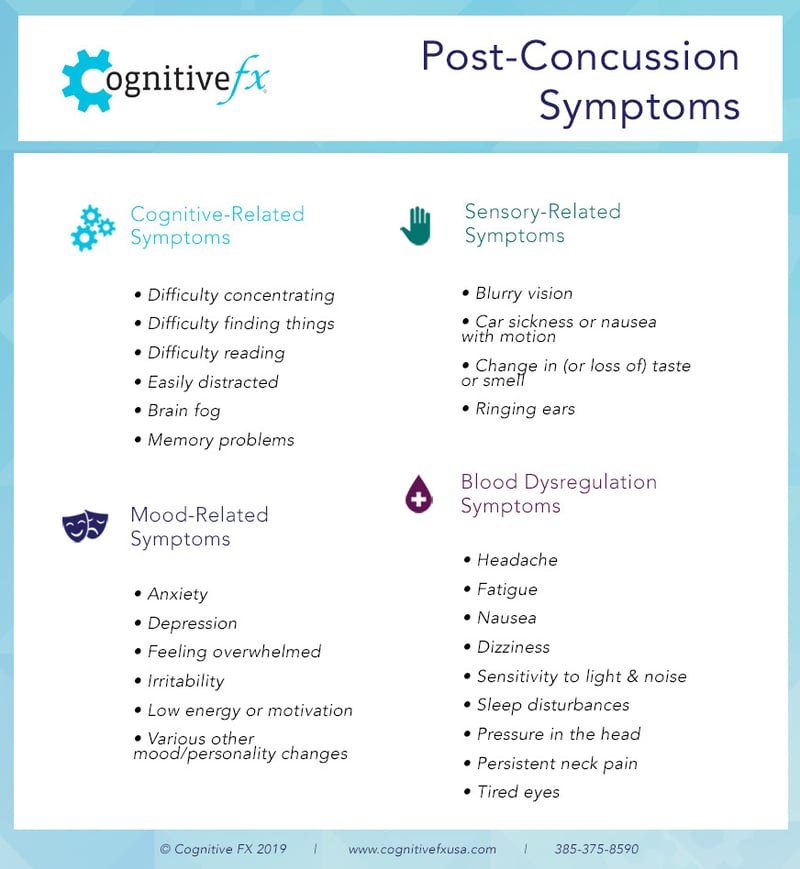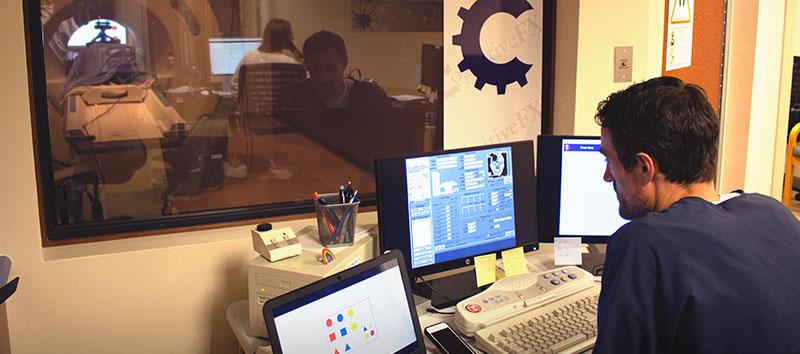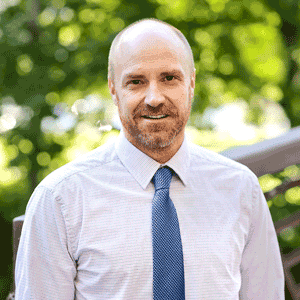How Many Voncusions Can You Have in High School Before You Cant Play Again
Concussions | Traumatic Brain Injury | Teaching & Resources | Postal service Concussion Treatment
If you're like the majority of people who have had a concussion, then you probable recovered a few weeks later and have felt fine ever since then. Concussive symptoms typically resolve in 7 to 10 days (sports-related concussions) or within iii months (not-athletes). But non everyone is that fortunate: upwardly to thirty% of post-concussion patients have lingering symptoms that don't become away with fourth dimension and rest.
And even if you do recover and walk away with no long-term symptoms, it isn't without consequence: Y'all will e'er be more susceptible to some other concussion than someone who hasn't had one, particularly during the commencement year afterwards your concussion.
Many people (especially athletes) who have had ane concussion continue to accept more. Co-ordinate to a report in the Journal of American Medical Association, athletes who accept sustained ane mTBI are more susceptible to farther brain injuries (Guskiewicz et al. 2003). And your experience recovering afterward multiple concussions may non be equally smooth: With every concussion, your chances of long-term symptoms (mail-concussion syndrome) increases.
At our concussion treatment clinic, we've treated many patients with repeated concussions whose symptoms did not simply go away with rest, as their doctors assured them they would. This article addresses the questions and concerns those patients had when they came to us. We'll cover:
- The Long Term Effects of Multiple Concussions
- Symptoms of Multiple Concussions
- The Link between Multiple Concussions and Depression, Anger, and Other Emotions
- Concerns for Athletes
- How to Care for Post-Concussion Syndrome.
If you're experiencing symptoms that won't resolve afterward multiple concussions, you're not solitary. And you're non crazy. 90% of our patients evidence symptom improvement after merely ane week of handling at our middle specializing in post-concussion therapy. To see if you are eligible for treatment, sign upwards for a consultation .
The Long-Term Effects of Multiple Concussions
In this section, we'll discuss what a concussion does to your brain and how multiple concussions play into that equation. Nosotros'll also go over the symptoms of multiple concussions so you know what to await for.
How Do Multiple Concussions Touch on the Brain?
A concussion (besides known as a mild traumatic encephalon injury, or mTBI) can come from jostling, shaking, or hitting your head. When y'all experience caput trauma, your immune arrangement causes inflammation near the site(s) of injury. Regions of your brain affected by the concussion suffer from a temporary breakdown of tiny structures in and around those cells.
During that time, those cells don't get plenty oxygen to ability the normal signaling your encephalon does on a regular footing. When y'all try to do something that those cells govern — like reading or balancing — they won't be able to attain the task. And then, other neural pathways will pick up the slack, even though it'due south a less efficient path for that information to take.
If yous've fully recovered from a head injury, your brain will go back to using the normal pathways for whatever given process. Unfortunately, that doesn't always happen. Sometimes, impacted cells are still unable to call for enough oxygen to complete the processes that they used to do. Usually, that suboptimal signaling produces long-lasting concussion symptoms.
The more times you've experienced brain trauma, the more probable you are to have long-lasting symptoms because of your brain'due south failure to return to normal. The long-term furnishings of repeated concussions can be responsible for everything from headaches to personality changes to forgetfulness. This condition is ofttimes known equally post-concussion syndrome.
Repeated brain trauma tin likewise disrupt salubrious performance of your autonomic nervous organisation , which we've addressed in the linked post.
Understanding Suboptimal Signaling

Suboptimal signaling pathways in your brain are like to the dissimilar routes you lot can take on your commute home. Some roads but accept more traffic than others. If you have to drive effectually an accident, you'll take longer to go domicile. And if you get stuck in a traffic jam, who knows how long the trip back will take (assuming y'all don't just give upward and eat dinner at a eating place while you look). In those situations, you end up tired and frustrated. What should be an easy trip home, isn't.
During healthy encephalon role, communication "traffic" — i.e., the signaling needed for a task like reading — would be as distributed along existing pathways. Information needing to take a suboptimal pathway is like getting stuck in a traffic jam or having to have the long way around. The impacted cells can't call for enough blood catamenia (and thus oxygen) to do their jobs, so other cells have to do the chore for them.
The more your brain has to use suboptimal pathways, the more tired it becomes. It's more likely for you to have symptoms. And with multiple concussions, there are only more than opportunities for that to happen. (Annotation that severity depends on the individual patient.)
The expert news is that those pathways can be mended — just non without a combination of concrete and cognitive therapy under the direction of a trained medical professional person. Nosotros'll talk more about that in the "How to Treat Postal service-Concussion Syndrome" department beneath.
The Symptoms of Multiple Concussions
The symptoms of multiple concussions are the same equally the symptoms of one concussion. Multiple concussions over time just mean the effects of a concussion (especially long-term symptoms) are more likely to exist noticeable and may take longer to resolve. Symptom severity depends more than on the private — things like genetic predisposition, for case — than on how many concussions you lot've sustained.
We've written at length nigh concussion symptoms, so nosotros won't reproduce all of that here. For reference, here's the symptoms of a concussion checklist we created:

Cognitive harm from head trauma tin can present in many ways — short-term memory loss, "foggy" thinking, blurred vision, difficulty finding things… As y'all tin see in a higher place, the listing is extensive. But lingering concussion symptoms aren't limited to the cognitive: You may notice you lot take balance problems, experience heartbeat irregularities, or get carsick (when you didn't before your concussion). This signals possible Autonomic Nervous System and/or cervical spine bug, such every bit claret dysregulation which, as shown above, tin crusade headaches, fatigue, nausea, dizziness, etc.
While the cumulative effects of repeat concussions can produce an increment in the number or severity of lasting symptoms, that isn't guaranteed. Some patients who have experienced only one concussion suffer worse symptoms than patients who have sustained multiple previous concussions. While yous might think that loss of consciousness at the time of injury is the best indicator for longer-lasting symptoms, that isn't the example. In reality, mental confusion at the time of your injury is the best indicator that you are at risk for long-term symptoms.
Can Multiple Concussions Crusade Depression, Anger, or Retention Loss?
Yep, multiple concussions can cause depression, anger, memory loss, and other symptoms that make you experience dissimilar yourself, this includes an increased chance of suicide (Byran and Clemans, 2013). Brain harm from a concussion can cause lasting emotional symptoms that do not resolve without treatment. Or, they may make existing struggles worse.
Searching for a diagnosis later on one or more concussions is hard, to say the least. Many doctors will ignore emotional symptoms or tell yous it's all in your head. And while you may find helpful coping mechanisms from a psychologist, you lot won't become handling that fixes the root cause (if it's from a concussion). That bike of beingness told you're crazy — or that no one can help you — only makes symptoms worse.
Notation : Many of our patients were told that their condition is untreatable. That's not true. Post-concussion syndrome is not a status that many doctors treat, simply it is often treatable. There is promise. To learn if you're eligible for treatment, schedule a consultation with our staff.
Besides, we recently created an online course that covers which types of headaches you can get after a concussion, also as specific techniques for coping with those types of headaches. If you desire to learn how to manage your headaches at home, visit our class.

Repeated Concussions in Athletes

Athletes — especially those who play contact sports like football and hockey — are at higher chance for multiple concussions than the general population. If you're an athlete recovering from a concussion, do not return to your sport until you are fully healed. Follow the render to play protocol establish on the website of the Centers for Illness Control and Prevention. Whether you're a high school athlete, college athlete, a retired athlete, or notwithstanding competing later in life, the dangers are the aforementioned.
Unfortunately, sustaining one concussion means that y'all are at gamble for more. During recovery, your brain needs time to heal. Head trauma could affect coordination, rest, and other skills needed to proceed y'all safe during practice. You're more likely to get another concussion when those abilities are compromised.
It's worth noting: if you sustain a 2nd concussion while recovering from the first concussion, y'all risk longer-lasting symptoms and brain damage. In extremely rare cases, some patients die from "second affect syndrome," a condition nosotros don't fully understand, that involves a rapid swelling reaction in their brains. Never render to sports earlier your concussion has healed.
Even when you've healed from your first sports concussion, you are still more probable to get another concussion. And then what does that mean for you? Information technology means yous accept a determination to brand. If y'all're ambivalent toward your sport, you could choose to play a sport with lower concussion risk. If you love your sport and desire to continue playing, you should evaluate how you practise and perform. Are there steps you lot tin take to reduce your chances of concussion? Can you lot take fewer risks?
Higher up all, don't let anyone — be it your passenger vehicle, your teammates, or yourself — push you into doing something yous're uncomfortable doing. It's not worth the risk to your safety.
What Well-nigh Dementia Risk in Athletes?
If you're a serious athlete who has sustained multiple concussions, yous may have been told yous're at a higher take chances of developing a neurodegenerative disease later in life. Recent studies have shown a link between multiple sports concussions and chronic traumatic encephalopathy (CTE), a kind of dementia. Some researchers have found that traumatic brain injuries can be a trigger for changes in the brain nowadays in those with Alzheimer'southward illness.
While there may be a link between sustaining head trauma and developing Alzheimer'due south later in life, there is much we even so don't know. We also don't know if treating lingering post-concussion symptoms could decrease the risk of developing dementia as a result of previous concussions.
How to Care for Post-Concussion Syndrome

Even if you've sustained multiple concussions over time, the kind of treatment y'all need is the aforementioned as for someone who has just sustained one concussion. Withal, that doesn't mean your treatment regimen volition look the same every bit another person's. The specific therapies you need depend on where the damage in your brain is along with what kind of suboptimal signaling you're experiencing.
Let's back up for a moment. In the department to a higher place, we explained that your brain might create suboptimal pathways in order to avoid injured sections of your brain. Those areas could exist hypoactive (underperforming) or hyperactive (overperforming — to the extent that your brain "burns out" faster). From a symptoms perspective, the 2 often look the same. Just from a treatment perspective, they're completely different.
Patients who attend our clinic for post-concussion treatment all go through a battery of testing to evaluate their brains, their autonomic nervous system, their vision, and their vestibular function. Some of that information comes from an fNCI brain scan, which evaluates 56 brain regions. Using the fNCI, we likewise verify what changes happen in your brain afterward a calendar week of handling.
We utilise your evaluation results to create a custom treatment plan to target the areas of your encephalon that need help. Patients spend a week doing physical and cognitive therapy designed to repair the damaged pathways in your brain. Currently, there is no other method that successfully repairs encephalon damage from post-concussion syndrome. Whether you lot've had a history of concussions or just one, this treatment repairs lingering harm from the concussion.
Conclusion
If you're experiencing symptoms that won't resolve later multiple concussions, you're not alone. And you lot're not crazy. 90% of our patients evidence symptom improvement after a week of treatment, with an boilerplate improvement of 60% in those symptoms. To run into if y'all are eligible for treatment, sign up for a consultation.
Source: https://www.cognitivefxusa.com/blog/multiple-concussions-effects-and-treatment




0 Response to "How Many Voncusions Can You Have in High School Before You Cant Play Again"
Post a Comment